Page Table of Contents
About the Author
Hot Topics
Updated on Jan 29, 2026
Quick Navigation: How to Fix Disk 100 in Task Manager (10 Tips)
Most Windows 11/10/8.1/8/7 users may have experienced this issue - Windows is running slow and has a slow response time. As the picture shows, your Windows 10 is at 100% usage. So, is 100 disk usage bad? Of course, if there is insufficient disk space for your PC, programs and system processes may not function properly, and it may cause data loss. To fix the Windows 10 100% disk usage issue, you must follow the tips below.
| Workable Solutions | Troubleshooting 100 Disk Usage |
|---|---|
| Ways 1. Restart Your Computer | Click the "Start" icon. Go to "Shut down or sign out > Restart."...Full steps |
| Ways 2. Check for Malware | Your security software should be able to deal with this, whether it's a free app or a paid suite...Full steps |
| Way 3. Update Windows 10 | Click the "Start" icon. Go to "Settings > Update & Security settings > Windows Update"...Full steps |
| Way 4. Fix Disk Error | Press the Windows key and type cmd. Right-click "Command Prompt" and...Full steps |
| More Effective Fixes | Disable Superfetch service > Clean Up Junk Files > Reset Virtual Memory > Perform a Clean Boot...Full steps |
Check What Causes Task Manager Disk 100% Usage in Windows 10
First, we're going to open the Task Manager and take a look at our disk usage. So, as you can see, it is now 100% and is slowing our computer down.
Step 1. Type Task Manager in the Windows search bar and select "Task Manager."
Step 2. In the Processes tab, look at the "Disk" process to see what is causing your hard disk 100% usage.
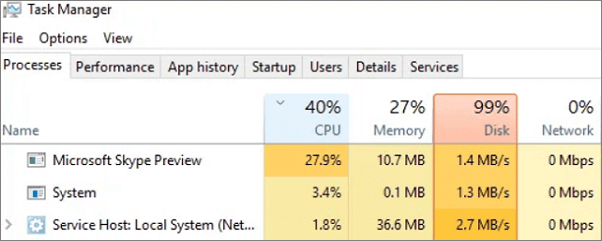
If you feel that Task Manager can't visually find the cause of high disk usage, you can also download Space Analyzer - EaseUS Partition Master Professional to analyze disk usage in one click, including finding large files and folders in Windows 11.
Step 1. Launch EaseUS Partition Master and turn to Discovery. Find and Download Space Analyzer below Frequently Used Tools.
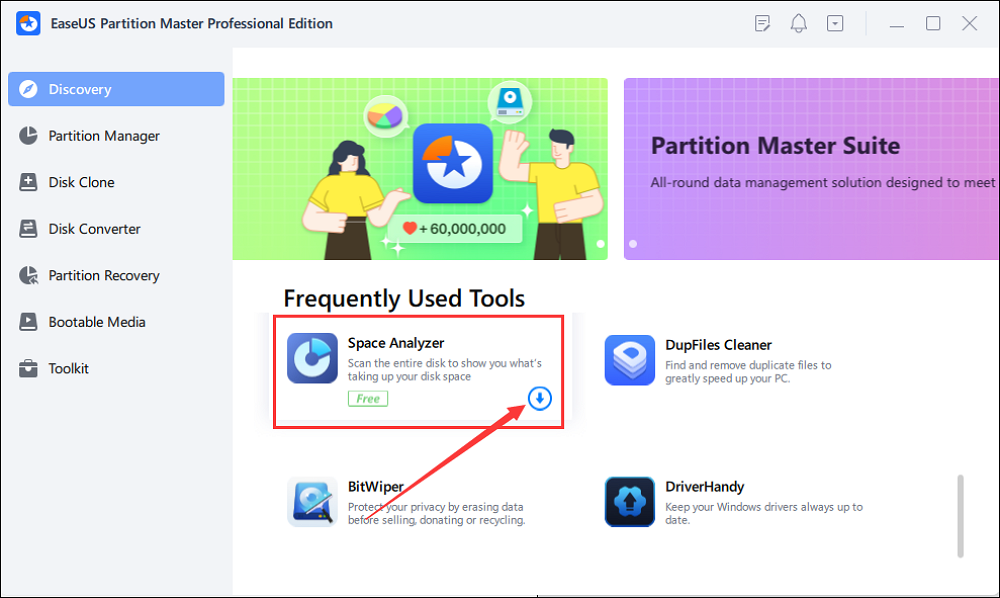
Step 2. In the Space Analyzer pop-up window, select the target disk to be analyzed and click Analyze in the upper right corner.
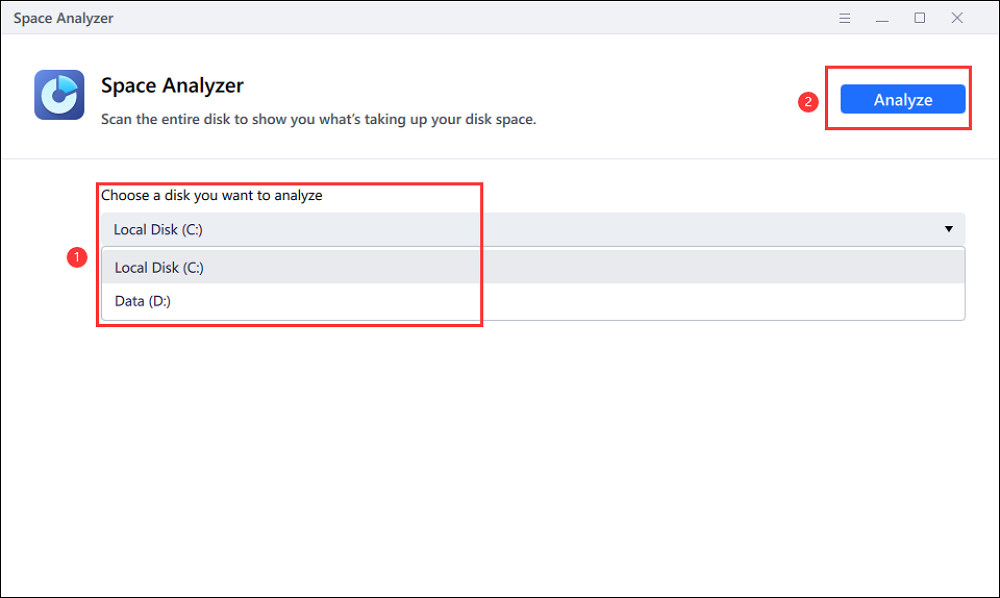
Step 3. Wait a while, and you will see the detailed data. You can click on Folder/File to view different data types and click on the small folder icon to see more information inside the file.
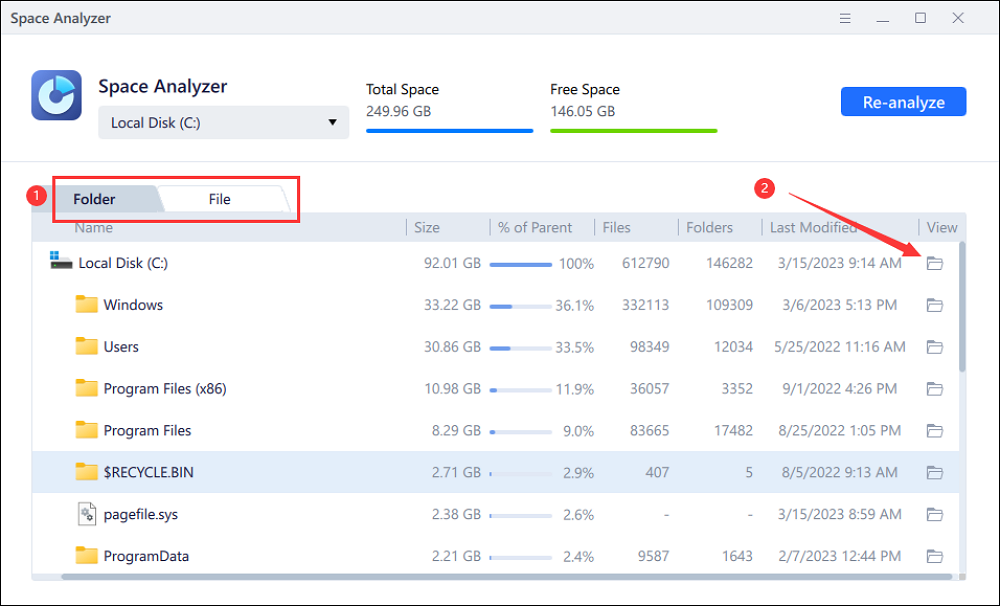
EaseUS Partition Master will issue a warning message if you are running low on disk space. Remember, 100% disk usage is not normal in Windows 10. Here are the top 10 methods that have helped other users fix their Windows 10 100% disk usage problem. Simply follow the operation procedures to resolve 100% disk usage in Task Manager. And don't forget to share this tutorial if your friends meet the same issue.
Way 1. Restart Your Computer to Fix 100 Disk Usage
We often restart our computer or laptop if the computer screen froze or Outlook crashes. A restart solves many computer issues, and your Windows 10 100% disk usage problem is no exception. You can also restart your PC to tackle this problem. It is a sufficient way.
Step 1. Click the "Start" icon.
Step 2. Go to "Shut down or sign out > Restart."
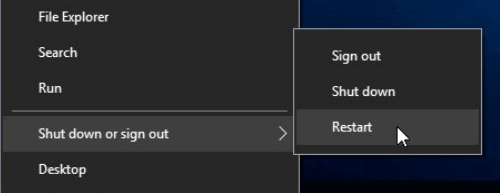
After the restart, you may have resolved your disk issue. If you still have a problem, read on.
Way 2. Check For Malware in Windows 10
Usually, the virus could be the leading cause of loss of situations, and 100% disk usage is no exception. Your security software should be able to deal with this, whether it's a free app or a paid suite. At the very least, tools such as BitDefender, Avast, and AVG anti-virus should be able to scan your system drive and detect any problems, although with a heavy load on your drive already, this may take a while.
This method would take some time since your disk is already experiencing high usage. However, it is still necessary to identify and remove malware. For a satisfying and reliable malware removal utility, you can try TotalAV. It enables you to run and clean up viruses, remove malware, and protect your privacy from online threats in real-time:
 TOTALAV
TOTALAVTotalAV is an Award Winning Antivirus and Security Software. It Provides Real-Time Protection from Viruses, Malware & Online Threats.
Antivirus Protection Enabled
Way 3. Update Windows to Solve 100 Disk Usage
The latest updates can often resolve severe problems with your Windows 10 and fix the Windows 11 disk usage 100. Make sure that you have the latest Windows updates installed on your PC. Windows 10 offers you the choice of when and how to get the latest updates to keep your device running smoothly and securely. To manage your options, follow the steps below.
Step 1. Click the "Start" icon.
Step 2. Go to "Settings > Update & Security settings > Windows Update."
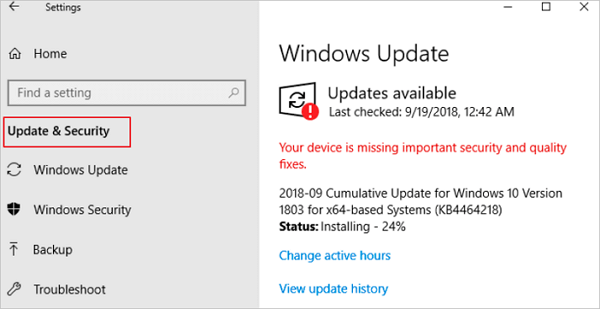
You can check for new updates and install them if they are available. This solution may do good to the overall performance of your system, including that of your hard drive.
Way 4. Fix Disk Error If 100 Disk Usage Still Exists
If none of the above works, you could have a problem with your hard drive.
Errors on the disk may also cause the disk to be 100. Malware, corruption, power problems, physical damage, or other causes may cause disk errors that can lead to data loss. Whenever you find your hard drive performing poorly or Windows asking you to repair drive errors, you can first try to run CHKDSK to do the job.
Step 1. Press the Windows key and type cmd.
Step 2. Right-click "Command Prompt" and choose "Run as administrator."
Step 3. Enter the following command: chkdsk E: /f /r /x
"E" means the drive letter of the partition you want to check.
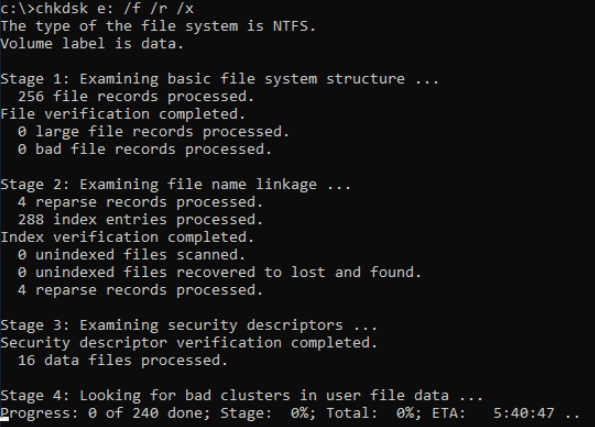
Way 5. Stop the Superfetch Service
Superfetch is like drive caching, which copies all your commonly used files to RAM. This feature allows programs to boot faster. However, if your system doesn't have the latest hardware, Service Host Superfetch can easily cause high disk usage. High disk usage due to this service isn't always a problem. You can stop this service to solve Windows 100 disk usage errors.
Step 1. Press Windows + R or type Run in the Windows 10 search box. Type services.msc into the "Open" box and click the "OK" button.
Step 2. Now find "Superfetch". Right-click it > select "Properties" > click "Stop" on the pop-up windows > click "Disabled" from the 'startup type' drop-down menu.
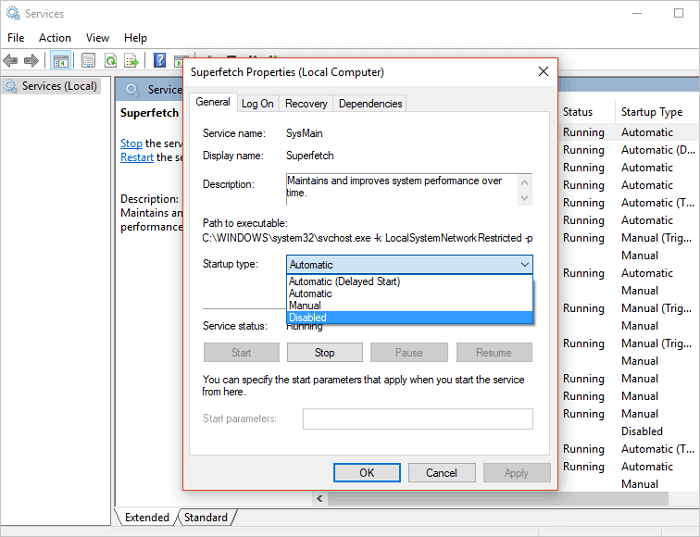
Way 6. Reset Virtual Memory and Increase the Ram
Virtual memory is a combination of RAM and a portion of your hard drive. "When the RAM isn't enough to perform a task, Windows will temporarily store files in virtual memory, then swap them back to RAM when required."
Some computers' operating systems don't support more than a certain amount of RAM. For example, 32-bit versions of Windows can't use more than 4 GB of RAM, so installing more than 4 GB of RAM is a waste. If your computer supports installing more RAM, click here to Increase the RAM. If increasing the RAM is a waste, reset the virtual memory.
Steps to reset virtual memory:
Step 1. Press the Windows key + Pause/ Break key at the same time. Then, choose Advanced System Settings on the left panel.
Step 2. Go to the "Advanced" tab, then click "Settings".
Step 3. Go to the "Advanced" tab again, and choose Change in the Virtual memory section.
Step 4. Make sure that the Automatically manage paging file size for all drives checkbox is NOT ticked.
Step 5. Select your Windows drive (the hard drive or partition that has Windows installed on it – usually C:), and enter an Initial size and Maximum size for your virtual memory:
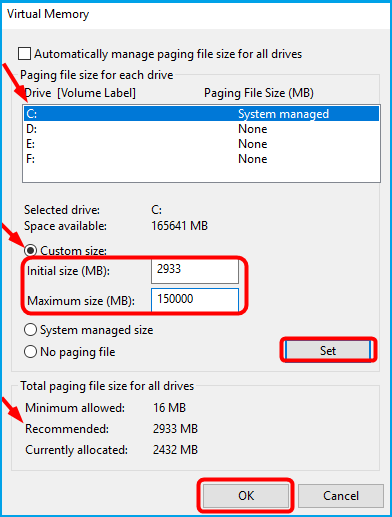
- Initial size: This value varies, depending on your computer.
- Maximum size: Don't set this value too high. It should be about 1.5 times the size of your physical RAM. e.g., a PC with 4 GB (4096 MB) of RAM should have no more than 6,144 MB of virtual memory (4096 MB x 1.5).
Once you've entered your virtual memory values, click Set, then click "OK" to continue.
Step 6. Clear all your computer's 'temp' files. On your keyboard, press the Windows key and R at the same time, then in the Run form, type temp and hit Enter. This will invoke Windows Explorer with your Temp folder open, showing you all the temp files on your computer.
Step 7. Select all the files in the Temp folder and delete them.
Way 7. Clean Up Junk Files and Running Memory
Clear up junk files and running memory appropriately will low disk usage. EaseUS CleanGenius offers you a junk file cleanup feature. You can clear up your PC for free without difficulty. Follow the simple steps to solve the 100% disk usage problem.
Step 1. Download and install EaseUS Partition Master Suite on your PC. Click to download PC Cleaner on panel.
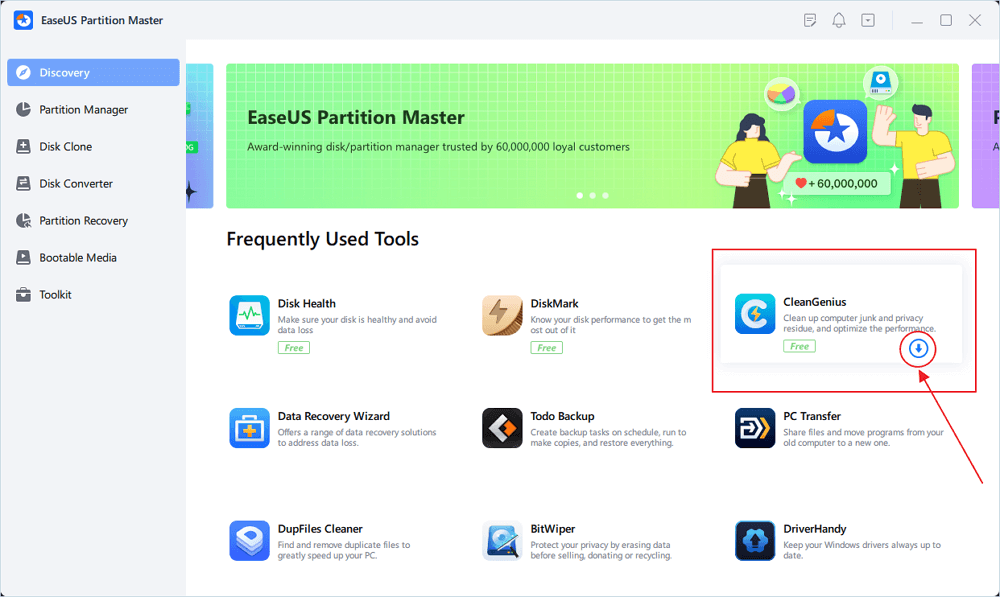
Step 2. Install EaseUS CleanGenius on your PC. To begin with, navigate to "Cleanup" and click "Scan."
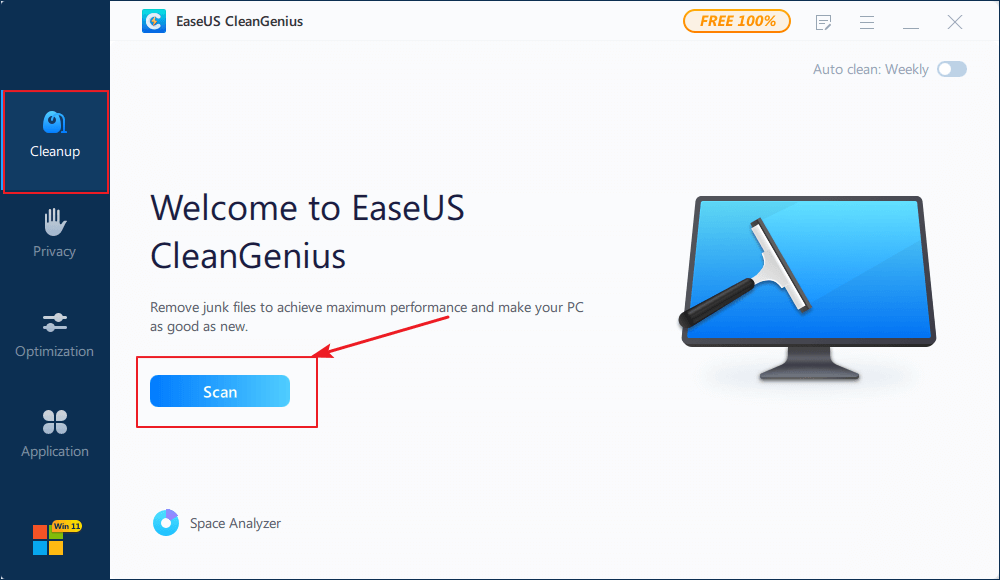
Step 3. EaseUS CleanGenius will start immediately to scan all the useless files, select system junk files and invalid entries, and click "Clean" over all your PC.
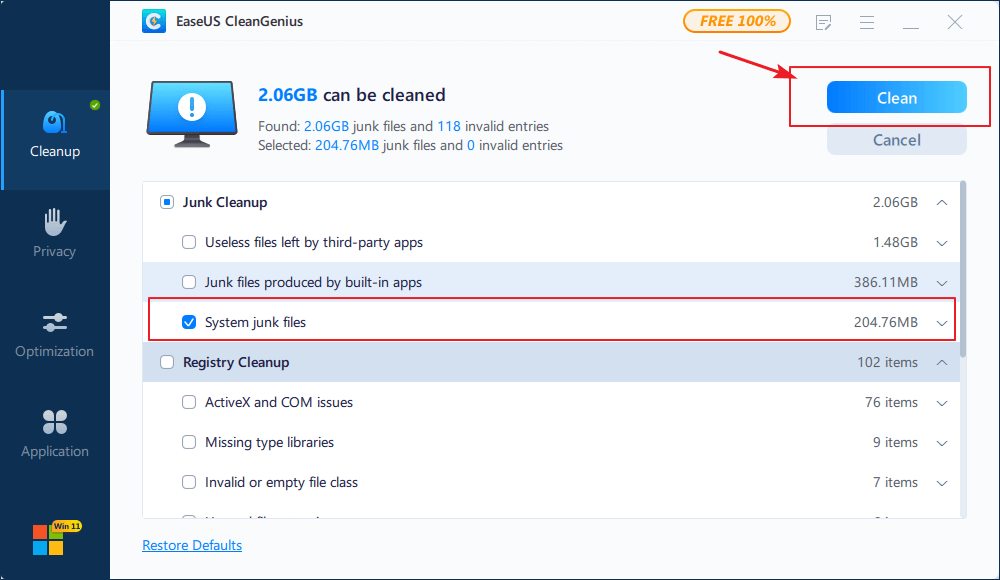
Step 4. Once completed, you can see clearly how many MBs or GBs of data are cleaned. Click "Done" to finish the process.
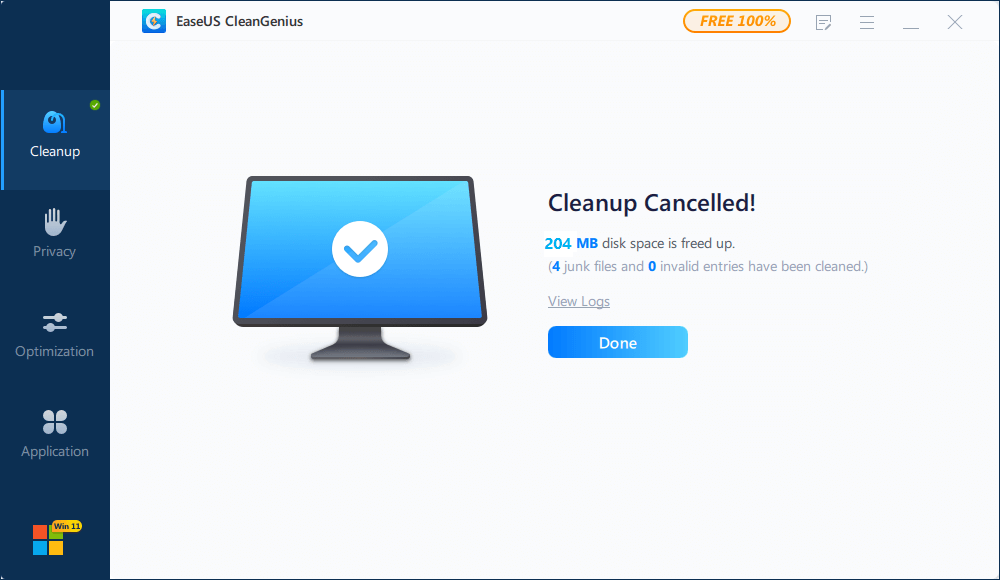
Using third-party tools will greatly help you clean up junk files and fix 100 disk usage on Windows. Next, we will continue to discuss more useful solutions.
Way 8. Perform a Clean Boot on Windows 10
Clean Boot State is used to diagnose and troubleshoot advanced Windows problems. A "clean boot" starts Windows with a minimal set of drivers and startup programs so that you can determine whether a background program is interfering with your system performance. If you have never performed a clean boot, now is the time to learn.
Step 1. Type msconfig in the start search and hit "Enter" to open "System Configuration."
Step 2. Click the "General" tab, and then click "Selective Startup." Clear the "Load Startup Items" checkbox, and ensure that "Load System Services" and "Use Original boot configuration" are checked.
Step 3. Click the "Services" tab. Select the "Hide all Microsoft services" checkbox. Select the item and then select "Disable all."
Step 4. Click "Apply/OK" and restart the computer. This will put Windows into a Clean Boot State.
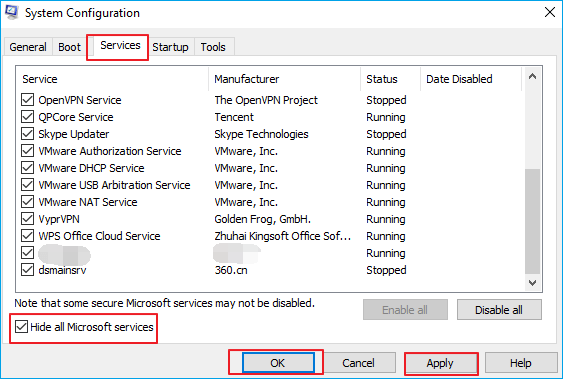
Way 9. Upgrade the Hard Drive to a Larger One
The hard drive that develops too many bad sectors would largely send your computer into a loop with 100 percent disk usage. Or, your computer hard drive might be too old to work properly, even if there is plenty of unused space available. Still, your computer functions like a turtle and consistently reports 100% disk usage.
It's time to upgrade the hard drive. EaseUS Partition Master can help you replace the hard drive in question with a new one without taking the time to reinstall Windows 11/10. This is how you start:
Connect the alternative hard disk to the computer (If it is a new hard disk, initialize it to an MBR disk).
Step 1. Select the source disk.
- Go to the "Clone" tab, click "Clone OS Disk" or "Click Data Disk". And then click "Next" to continue.
- Select the source disk that you want to copy or clone. Then, select "Next".
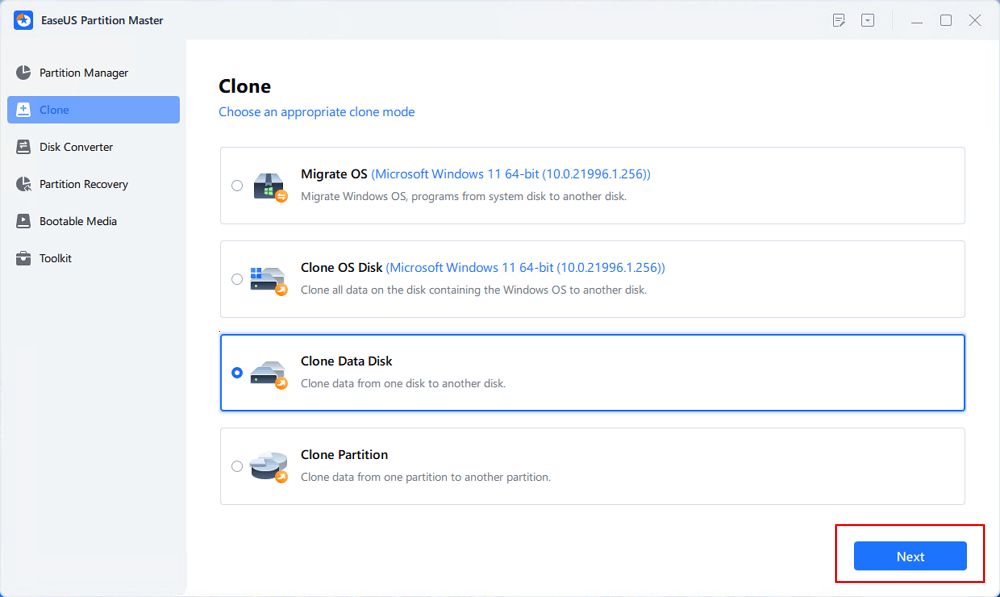
Step 2. Select the target disk.
- Choose the wanted HDD/SSD as your destination and click "Next" to continue.
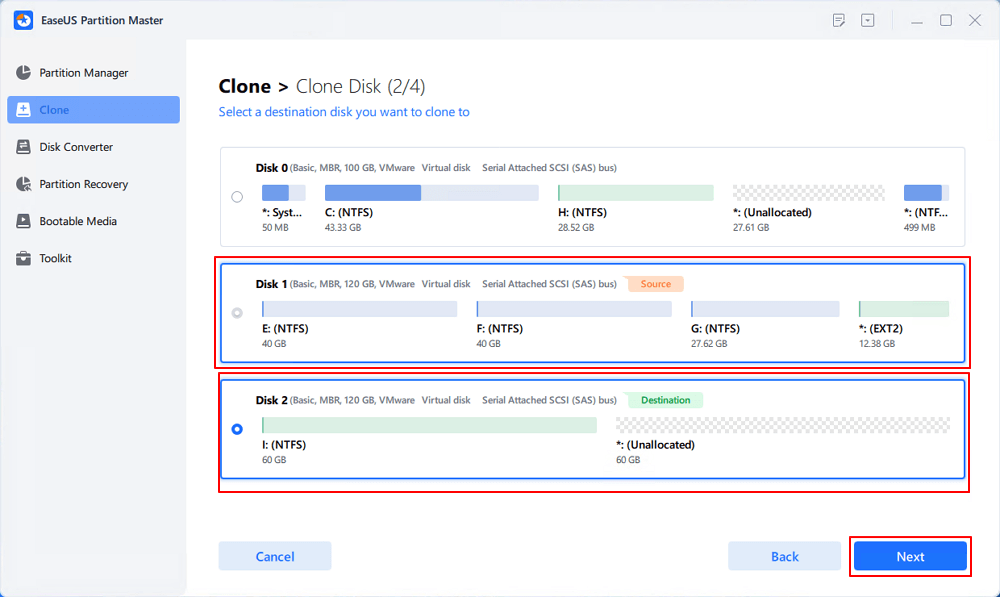
- Check the warning message and click "Yes" to confirm.
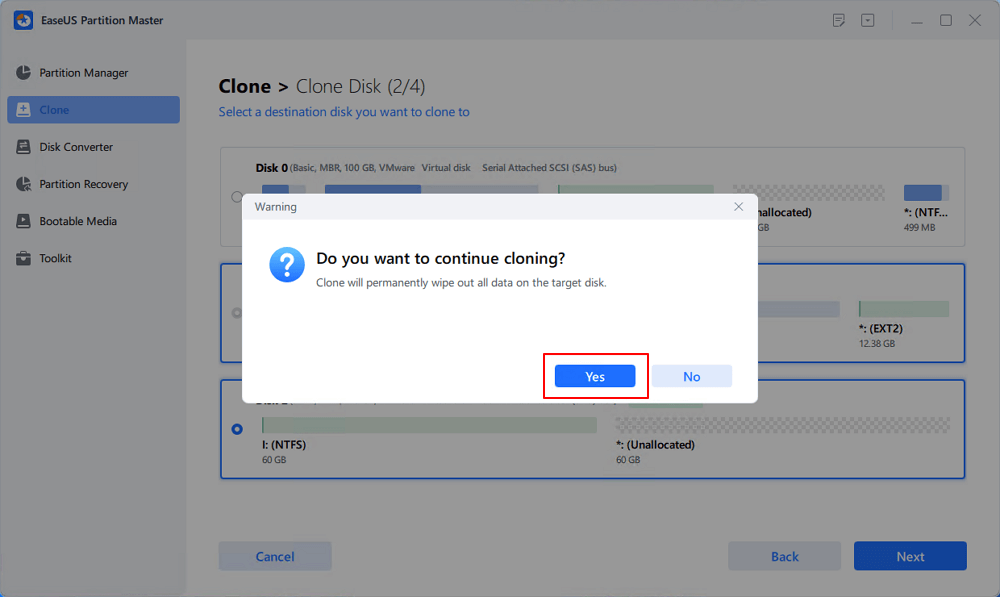
Step 3. Select clone mode.
You can select "Autofit the disk", "Clone as the source" to customize your disk layout.
Step 4. Click "Start" to start cloning process.
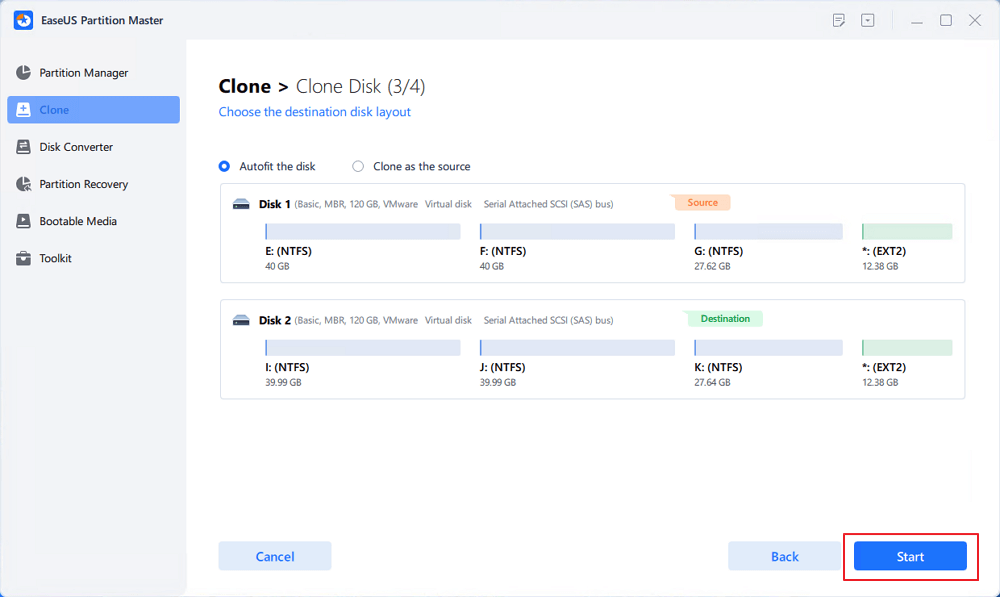
Way 10. Turn to Remote Assistance
Is the 100% disk usage issue slowing down your Windows 11 or Windows 10 computer? Have any of these methods fixed the problem? Tell us, and let's see if we can get it resolved. EaseUS also provides 1-on-1 remote assistance to fix Windows issues. If the solution above does not work, contact our professionals via email or LiveChat on this page.
If you like this passage, you can share it with other people in need.
Don't Try These Solutions to Fix Windows 10 100 Disk Usage (Important)
When you search for Windows 10 100 disk usage, you get millions of results to help you solve your problem.
However, I come across a whole bunch of solutions that just don't settle well with 100% disk usage in the task manager. But these operations cause problems later on. The situation is like this example - the whole arm has been anesthetized for a long time because you want to treat your finger. Try to avoid doing anything listed below:
Disabling the BITS Service - It's required by Windows for your PC to be updated, and it won't help to disable it.
Disabling Windows Search Services - Disabling this will not solve your problem. On the contrary, these are core Windows services, and you should not disable them.
Modifying Page File -You should leave it so Windows manages the page file. Don't try custom values.
Disabling Windows Defender - Don't disable Defender. Your computer may be infected with a virus.
Fix Service Host Superfetch High Disk Usage!
The disk usage is nearly 100 percent, which is caused by Service Host: Local System. Fix the issue now!
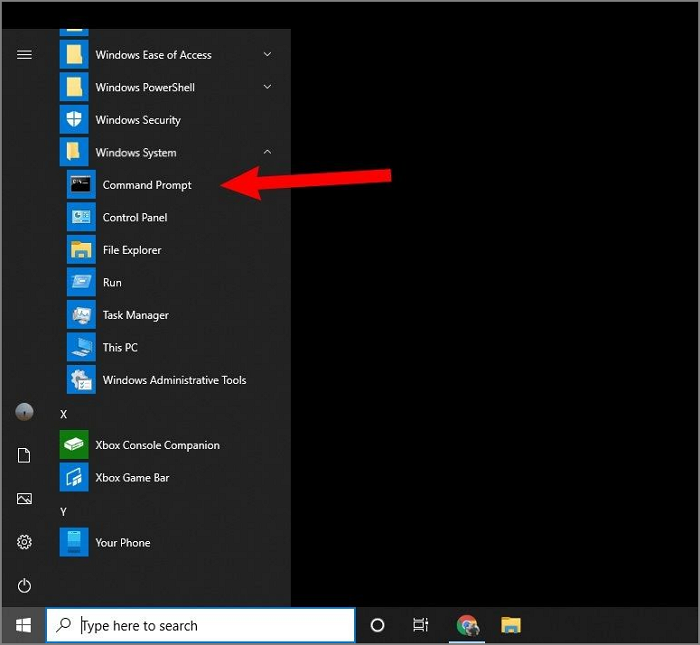
Conclusion
Try the real fixes to resolve disk 100 percent usage errors in the task manager. Before we start, you can use EaseUS Partition Master to analyze the usage of Windows disks and then, use it to upgrade the target hard drive to a bigger one or delete the junk files.
Besides, remember to avoid the four useless solutions, as I have mentioned before. If you still have problems, you can always ask us for help. We are glad to help.
Related Questions About 100% Disk Usage
There are hot topics about the 100 percent disk usage issue on the internet. You can read on if you are interested in any one of them.
Why is my disk usage at 100 Windows 10?
In general, your hard drive should never be 100% usage, so if it is, there is some reason for the condition. You need to fix the issue or risk a very slow-moving computer. You can check your disk situation in the task manager and solve the problem in this post.
Is 100 disk usage bad?
Even if your drive seems pretty comfortable acting as a chronic overachiever, keep in mind that 100% disk usage is not something good for you. Your disk working at or near 100 percent causes your computer to slow down and become laggy and unresponsive. As a result, your PC cannot perform its tasks properly.
Is it OK to disable SuperFetch?
Yes! There is no risk of side effects if you decide to turn it off. We recommend that if your system is running well, leave it on. If you have issues with high HDD usage, high RAM usage, or degraded performance during RAM-heavy activities, then try turning it off and see if it helps.
How much RAM do you need for Windows 10?
2GB RAM. 2GB of RAM is the minimum system requirement for the 64-bit version of Windows 10.
How Can We Help You
About the Author
Sherly joined EaseUS in 2022 and she has always loved writing articles and enjoys the fun they bring. She receives professional training here, focusing on product performance and other relative knowledge. She has written over 200 articles to help people overcome computing issues.
Brithny is a technology enthusiast, aiming to make readers' tech lives easy and enjoyable. She loves exploring new technologies and writing technical how-to tips. In her spare time, she loves sharing things about her game experience on Facebook or Twitter.
Product Reviews
-
I love that the changes you make with EaseUS Partition Master Free aren't immediately applied to the disks. It makes it way easier to play out what will happen after you've made all the changes. I also think the overall look and feel of EaseUS Partition Master Free makes whatever you're doing with your computer's partitions easy.
Read More -
Partition Master Free can Resize, Move, Merge, Migrate, and Copy disks or partitions; convert to local, change label, defragment, check and explore partition; and much more. A premium upgrade adds free tech support and the ability to resize dynamic volumes.
Read More -
It won't hot image your drives or align them, but since it's coupled with a partition manager, it allows you do perform many tasks at once, instead of just cloning drives. You can move partitions around, resize them, defragment, and more, along with the other tools you'd expect from a cloning tool.
Read More
Related Articles
-
How to Combine Two SSD Drives [Complete Guide in 2026]
![author icon]() Brithny/2026/01/29
Brithny/2026/01/29 -
3TB Hard Drive Only Shows 2TB - How to Break 2TB Limit and Format 3TB HDD Windows 11/10
![author icon]() Cedric/2026/01/29
Cedric/2026/01/29 -
SSD Health Check Software Free Download in 2026
![author icon]() Tracy King/2026/01/29
Tracy King/2026/01/29 -
Change Windows Password Using Command Prompt - 2 Ways
![author icon]() Sherly/2026/01/29
Sherly/2026/01/29
Hot Topics
EaseUS Partition Master

Version 20.0 is here - full exFAT support, easier disk partitioning, and PC performance optimization.








